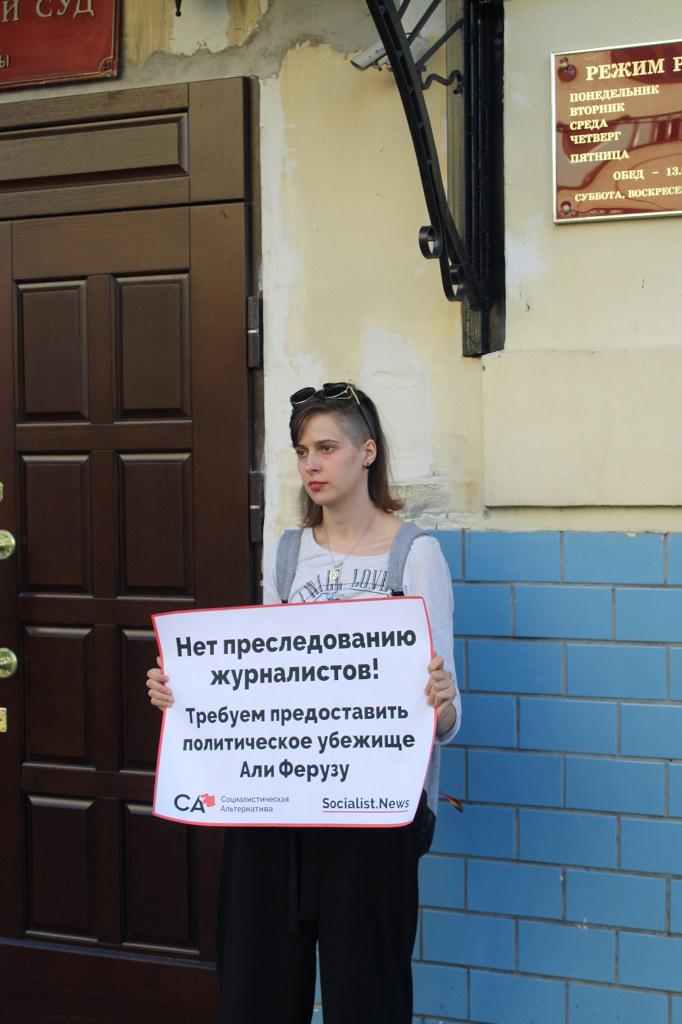Russia: Journalist Faces Expulsion to Uzbekistan
| Publisher | Human Rights Watch |
| Publication Date | 2 August 2017 |
| Cite as | Human Rights Watch, Russia: Journalist Faces Expulsion to Uzbekistan, 2 August 2017, available at: https://www.refworld.org/docid/598338274.html [accessed 21 May 2023] |
| Disclaimer | This is not a UNHCR publication. UNHCR is not responsible for, nor does it necessarily endorse, its content. Any views expressed are solely those of the author or publisher and do not necessarily reflect those of UNHCR, the United Nations or its Member States. |
An Uzbek journalist and asylum-seeker faces a risk of ill-treatment, including torture, if Russia returns him to Uzbekistan, Human Rights Watch said today. Khodoberdi Nurmatov, whose expulsion Moscow's Basmanny district court ordered on August 1, 2017, is a journalist known as Ali Feruz with one of Russia's leading independent investigative newspapers, Novaya Gazeta. He covers such issues as hate crimes, migrant workers' rights, and discrimination against lesbian, gay, bisexual and transgender (LGBT) people. "Russia has an obligation to protect Nurmatov, not send him directly into harm's way," said Rachel Denber, deputy Europe and Central Asia director at Human Rights Watch. "Uzbekistan has a long and well-established record of torture, and there is little doubt that Nurmatov faces a serious risk if he's forcibly returned there." A journalist with Novaya Gazeta who works closely with Nurmatov told Human Rights Watch that Nurmatov fled Uzbekistan in 2008, after Uzbekistan's security services detained him. The court ruled that Nurmatov had violated Russia's migration rules and sanctioned his expulsion. Russian authorities should uphold its human rights obligations and ensure that Nurmatov is not expelled or otherwise forcibly returned to Uzbekistan, where he risks serious ill treatment, Human Rights Watch said. Police took Nurmatov into custody directly after the court hearing and transferred him to a temporary holding center for foreign nationals, operated by the Interior Ministry in Sakharovo, a Moscow suburb. Nurmatov will promptly appeal the decision to the Moscow city court. His lawyers will also seek an emergency order from the European Court of Human Rights instructing Russia to suspend the expulsion. Nurmatov's Novaya Gazeta colleague said that Uzbekistan's National Security Service (SNB) detained, interrogated, and severely beat Nurmatov in September 2008 in an attempt to coerce him to become an informant on acquaintances and friends who were religious Muslims. After the SNB released Nurmatov, he fled to Kyrgyzstan, where he considered seeking refugee status but feared for his safety due to the risks of forced return and kidnappings that Uzbek asylum seekers faced there. In 2009, he traveled from Kyrgyzstan to Kazakhstan, where he contacted UNHCR, the UN refugee agency, about refugee status. He fled Kazakhstan in 2011 after Kazakh authorities forcibly returned to Uzbekistan at least 28 religious Muslims who had fled religious persecution in Uzbekistan. In 2011 he moved to Russia, where his mother and two siblings, all Russian citizens, live.  Expand
Expand
Activist outside Moscow's Basmanny District court on August 1, 2017 holds a poster declaring "Say no to persecution of journalists! We demand asylum for Ali Feruz."
© Cornelius Runtsch for Human Rights Watch, Moscow, 2017 In March 2016, Russia's Federal Migration Service denied Nurmatov's request for asylum, and in November Russian authorities rejected his request for temporary protection. The authorities rejected his application twice, and both times higher authorities overturned the rejection and returned the case for additional review. His current application is under review. Svetlana Gannushkina, a leading expert on migration issues in Russia, told Human Rights Watch that the "court ruling on Ali's expulsion from Russia was simply lawless because by Russian law, he has the right to remain in Russia while his request [for temporary protection] is under review." In 2012 Nurmatov lost his Uzbek passport and other identification documents, and reported the loss to police. Novaya Gazeta said he did not seek to replace his passport, fearing threats to his security if he approached the Uzbek embassy. In March 2017, police in Moscow detained Nurmatov and questioned him about his journalism work and his temporary protection application. They released him 12 hours later. Uzbek authorities have imprisoned thousands of people on politically motivated charges, most of them religious believers, who, like Nurmatov's friends on whom the SNB wanted Nurmatov to inform, practice forms of Islam that authorities brand "extremist." They have also imprisoned rights and opposition activists, journalists, and other perceived critics. Authorities frequently torture detainees and arbitrarily extend their sentences. In its last review of Uzbekistan, in 2013, the UN Committee against Torture found that torture in Uzbekistan was "'systematic,' 'unpunished,' and 'encouraged' by law enforcement and security officers." Uzbekistan's new president, Shavkat Mirziyoyev, has promised reforms, but such endemic problems as torture and politically motivated detention have yet to be addressed, Human Rights Watch said. Russia's obligations as a party to the Convention against Torture and the European Convention on Human Rights include ensuring that no one in Russian custody is forcibly sent to a place where they face a real risk of persecution, torture, or other serious human rights violations. The European Court of Human Rights has issued numerous rulings, including on cases emanating from Russia, forbidding forced returns to Uzbekistan because of the risk of torture anyone returned would face there. "It's difficult to imagine what more information Russian authorities need to be persuaded of the dire risk of abuse Nurmatov faces in Uzbekistan," Denber said. "Now they need to do what's right, and what the law prescribes - to free Nurmatov, protect him, and not return him to Uzbekistan."

